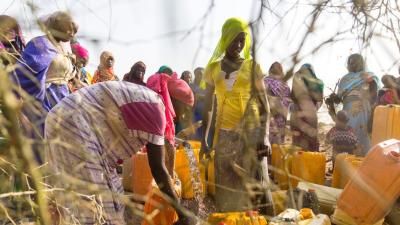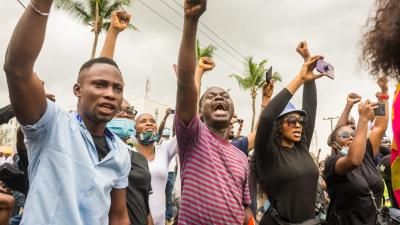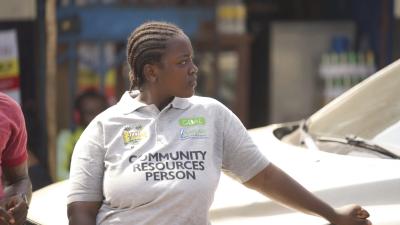The findings come from the latest report from the Lloyd’s Register Foundation World Risk Poll, powered by Gallup: ‘A Resilient World? Understanding vulnerability in a changing climate’. It presents data from over 125,000 people in 121 countries and reveals how people feel their communities and their country’s infrastructure and government can cope in the face of disasters.
With a 0.44 score, much lower than the world average of 0.55, Central and Western Africa is the lowest ranked global region on the World Risk Poll Resilience Index. Set between 0 and 1, it is calculated from scores in four areas – individual resilience, household resilience, community resilience and society resilience.
According to the data – collected in 2021 – only 29% of people in Central and Western Africa feel their families are prepared to deal with a disaster, the fifth lowest region in the world. Yet more than a quarter (26%) of people in the region said they had experienced a disaster in the past five years – with flooding being the most common cause, especially in Nigeria (where 75% of those who had experienced a disaster said this was the cause), Gabon (73%) and Ghana (73%) – roughly twice the world average, which sits at 37%.
The Poll also reveals a considerable lack of confidence in governments across Central and Western Africa – only one of two regions where the majority of respondents (56%) say their government does not care about them ‘at all’. In some countries, that figure rises to around two thirds: Senegal, for example, has the highest percentage of people feeling like their government does not care about them at all (67%), closely followed by Nigeria (64%) and Gabon (63%).
However, the data also shows how greatly people in Central and Western Africa have suffered in the face of disasters. The majority of the population, across all countries in the region, have reported shortages and difficulties accessing vital resources. In the past year before the Poll was conducted, at least three quarters of people have gone without electricity for more than a day in Nigeria (93%), Cameroon (86%), Gabon (84%) Togo (80%), Ghana (76%) Ivory Coast (76%) and Congo (75%). Similar issues accessing clean drinking water were also reported, with a majority of the population having found themselves unable to access it for more than a day in all countries except Mali (35%), Nigeria (46%) and Ghana (36%) – with Gabon topping the list (85%).
The data also reveals a lack of confidence in the region’s already limited infrastructure. Only around a third (35%) of respondents in Central and Western Africa feel their national government is well-prepared to deal with a disaster, a figure that drops to 27% when asked the same question about local government. Meanwhile, less than a third (31%) have faith in their hospitals’ ability to cope.
Nonetheless, there is a strong sense of community support across the region that may help people cope in a crisis, in the absence of government support. Central and Western African respondents to the Poll were among the most likely to help a stranger in need – seven in 10 (70%) said they had done so in the past month. The proportion of people who felt like their neighbours cared ‘a lot’ about them and their wellbeing also exceeded the world average (23%) in all countries in the region apart from Gabon (13%) and Congo (20%). This sentiment is especially strong in Mali, where 57% of respondents felt their neighbours cared a lot about them and their wellbeing, in Guinea (56%), and in Sierra Leone (51%).
Dr Sarah Cumbers, Director of Evidence and Insight at Lloyd’s Register Foundation, said: “The World Risk Poll is designed to provide insight for policymakers into which risks are most affecting the lives of populations across the world, and our findings will help them work with communities to improve resilience in the face of increasingly common and severe natural hazards such as flooding.
“Many countries in Central and Western Africa struggle with widespread poverty, violence and instability. Combined with weaker infrastructure, these factors mean people in the region are particularly vulnerable to disasters – as illustrated by the region’s low Resilience Index score.
“Our report highlights an underlying lack of faith in governments and institutions, driving people to rely on their neighbours and communities to support them in a crisis, especially in light of common resource shortages. With high experience of disasters in the region, particularly those caused by flooding and heavy rain, upgrading and investing in infrastructure to improve resilience needs to be a priority for those seeking to combat climate changes and its effects.”
Download the report here. Download individual Central and Western Africa country snapshots, as well as country-specific data snapshots for all other countries in the Poll here.
Funding is available from Lloyd’s Register Foundation for further research and interventions using World Risk Poll data to reduce risk and improve resilience. Find out more here.



